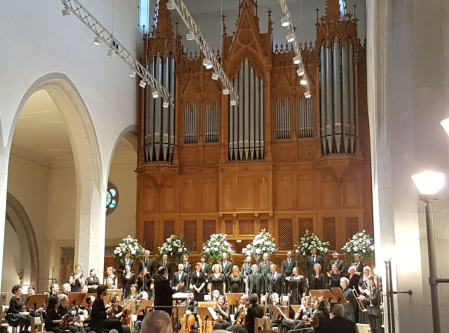
 Switzerland Bach: Soloists and Chorus of the Balthasar Neumann Choir, B’Rock Orchestra / Ivor Bolton (conductor), Stadtkirche St. Johann, Schaffhausen, 13.5.2018. (CCr)
Switzerland Bach: Soloists and Chorus of the Balthasar Neumann Choir, B’Rock Orchestra / Ivor Bolton (conductor), Stadtkirche St. Johann, Schaffhausen, 13.5.2018. (CCr)

Bach – Mass in B minor
Soloists – Agnes Kovacs (soprano), Stephanie Firnkes (alto), Anne Bierwirth (alto), Katja Stuber (soprano), Jakob Pilgram (tenor), André Morsch (bass), Heike Heilmann (soprano), Terry Wey (countertenor), David Pichlmaier (bass), Linard Vrielink (tenor)
Some forward-thinking Bach lovers and boosters of the Swiss city of Schaffhausen, north of Zurich and entwined by the German border, realised the idea in 1946 to host a music festival every three years devoted to Bach’s music and to the larger goal of linking Switzerland and (then-humiliated) Germany together more closely via culture. The festival, now held every two years, has more than met its goal, hosting top performers and offering admirers of Bach’s oeuvre a programme full of delights. The traditional closing to the five-day festival is the B minor Mass, which was conducted at this, the 27th International Bachfest by Ivor Bolton.
It was held in the Gothically handsome Kirche St. Johann – reformed, white Baroque plaster inside, an exquisitely prominent organ dominating the entire chancel. The church was large and full. Maestro Bolton had the B’Rock Orchestra and the Balthasar Neumann Choir at his behest. Ivor Bolton is best known to music lovers in Switzerland as the principal conductor of the Basel Symphony Orchestra; the B’Rock Orchestra play mainly in Belgium and – despite a gimmicky name – are expert players of baroque instruments; and Gramophone magazine described the Balthasar Neumann Choir from Freiburg, Germany, as ‘one of the best choirs in the world’.
Bolton conducts with his hands, and his shoulders, and probably his face. He need not strictly keep the beat with musicians of this calibre; his focus appeared to be first and foremost on bringing each word and line of music to its fullest expression, pointing with his fingers but also lifting, swooping, nearly dancing his cues and commands. He extracted a most joyous and exultant performance from these two fine ensembles, mechanically watertight and musically brilliant.
The Balthasar Neumann choir has singers in its own ranks strong enough to perform the Mass’ arias, and the integration of solos into the choral whole that this approach lends is very valuable. If the trade-off is that no soloists bring the house down with a massive, stage-y voice, then all the better, for the work at hand is one monumental testament of what Christians believe when they follow their God, leaving little room for showboating. The choir is not huge, meaning that its sound is less a wall than an intricate wave; at no point does it lack the resonance to convey the spirit and meaning of Bach’s intent. This was evident in its ‘Qui tollis peccati mundi’: no bombast, no stray tricks, just clear diction and sincere expressivity in a very full sound.
What did stand out was when countertenor Terry Wey began the ‘Agnus Dei’ with great vocal colour and presence. His fellow singer Anne Bierwirth delivered two arias, one soprano (the ‘Laudamus te’ from the Gloria section) and one alto (‘Qui sedes’, also from the Gloria) that were similarly lovely, though in Bierwirth’s case this was more the result of her disarming sincerity and splendidly emoted text than any bigness in her voice. The other soloists were ‘merely’ very good.
Instrumentally, the evening was a masterful example of how to unite an orchestra with singing, never too loud, always prominent, with a number of standout passages in the flute (Tami Krausz particularly), oboe, and brass. The horn struggled with pitch in the Gloria’s ‘Quoniam tu solus Sanctus’, and this heavily bass passage was the only one in which Bolton’s faster tempo for the Mass led to an overall muddy sound. The strings were superb – they offered unwavering buoyancy to the singing, perfect metre, and kept their own melodic lines clear and compelling. The dynamics Bolton solicited were intelligent, appropriate, and artistically sublime.
The work’s Latin text can lend one to think that the Bach’s B minor Mass is more abstracted than its German-language siblings (the two Passions, say), less related to the individual experience of religion and more engaged in a symphonic testimony to the grandeur of Christian belief. Upon hearing this performance, I am inclined to rethink this. It is true that the more distant Latin makes the music speak more for itself, towards absolutism, what Hanslick referred to as ‘form moving in sound’. But listen closely and it is every bit as intimate as a cantata. Each line of the Nicene Creed is manifested in programmatic music, achieving abstraction not via distance but via godly elegance. Bach’s more detailed depictions of suffering elsewhere are here replaced with a grander, more triumphal score, but present in every metre is his eternal sense of mystery, reverence, adulation.
Ivor Bolton’s conducting, and the vibrant musicianship of the B’Rock Orchestra and the Balthasar Neumann Choir, evinced this. I look forward to the next time I have the good fortune to hear these two excellent ensembles with any conductor, and to any chance to hear Bolton again at the helm.
Casey Creel
